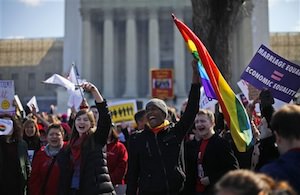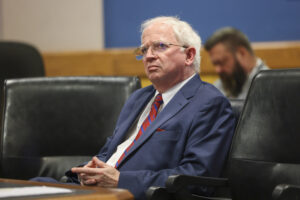Gay Marriage Rulings: Supreme Court Strikes Down DOMA, Denies Proposition 8 Backers’ Appeal
On Wednesday morning, the Supreme Court issued decisions on a pair of landmark same-sex marriage cases, striking down the Defense of Marriage Act while ruling the proponents of California's Proposition 8 lacked standing to argue the case in federal courts. On Wednesday morning, the Supreme Court issued decisions on a pair of landmark same-sex marriage cases.
On Wednesday morning, the Supreme Court issued decisions on a pair of landmark same-sex marriage cases, striking down the Defense of Marriage Act while ruling the proponents of California’s Proposition 8 lacked standing to argue the case in federal courts.
By a 5-4 vote, the justices ruled DOMA–the 1996 law that denies federal benefits to legally married gay couples — is “unconstitutional as a deprivation of the equal liberty of persons that is protected by the Fifth Amendment.” Justice Anthony Kennedy, who joined the liberal bloc of the court, wrote the majority opinion.
“DOMA singles out a class of persons deemed by a State entitled to recognition and protection to enhance their own liberty. It imposes a disability on the class by refusing to acknowledge a status the State finds to be dignified and proper. DOMA instructs all federal officials, and indeed all persons with whom same-sex couples interact, including their own children, that their marriage is less worthy than the marriages of others,” Kennedy wrote. “The federal statute is invalid, for no legitimate purpose overcomes the purpose and effect to disparage and to injure those whom the State, by its marriage laws, sought to protect in personhood and dignity.”
Chief Justice John Roberts and Justices Antonin Scalia and Samuel Alito wrote dissenting opinions.
According to Reuters, “As a result of Wednesday’s ruling, Edith Windsor of New York, who was married to a woman and sued the government to get the federal estate tax deduction available to heterosexuals when their spouses die, will be able to claim a $363,000 tax refund.”
In Hollingsworth v. Perry, the case on California’s Proposition 8 that bans same-sex couples from marrying in the state, Roberts and Scalia–two strong conservatives–joined with liberal Justices Ruth Bader Ginsburg, Stephen Breyer and Elena Kagan in the 5-4 vote to rule that the Proposition 8 proponents who stepped in after the state declined to defend the ballot initiative in the lower federal courts didn’t have standing.
“We have never before upheld the standing of a private party to defend the constitutionality of a state statute when state officials have chosen not to. We decline to do so for the first time here,” Roberts wrote in the majority opinion. “Because petitioners have not satisfied their burden to demonstrate standing to appeal the judgment of the District Court, the Ninth Circuit was without jurisdiction to consider the appeal. The judgment of the Ninth Circuit is vacated, and the case is remanded with instructions to dismiss the appeal for lack of jurisdiction.”
Kennedy wrote the dissent, which the other three justices signed on to.
SCOTUSblog’s Amy Howe explained the court’s decision during the website’s live discussion. “After the two same-sex couples filed their challenge to Proposition 8 in federal court in California, the California government officials who would normally have defended the law in court, declined to do so,” she wrote. “So the proponents of Proposition 8 stepped in to defend the law, and the California Supreme Court (in response to a request by the lower court) ruled that they could do so under state law. But today the Supreme Court held that the proponents do not have the legal right to defend the law in court. As a result, it held, the decision by the U.S. Court of Appeals for the Ninth Circuit, the intermediate appellate court, has no legal force, and it sent the case back to that court with instructions for it to dismiss the case.”
According to the San Jose Mercury News, the decision effectively paves the way for same-sex couples to marry in the state again soon, something Truthdig columnist Bill Blum cited as a possibility after oral arguments were heard back in March.
“The court also could hold on procedural grounds…that the proponents of Proposition 8 lack legal standing to prosecute the case because they are not official agents of the state, which has declined to defend the measure,” Blum wrote. “In that event, the court would dismiss the appeal, which would in turn reinstate the order handed down in 2010 by U.S. District Judge Vaughn Walker, who overturned Proposition 8 on equal protection grounds as lacking any rational legal basis. The result: Same-sex weddings in California would resume.”
The San Jose Mercury News:
The Supreme Court’s decision in the Proposition 8 case punctuates the state’s nine-year struggle over gay marriage, which began in 2004 when former San Francisco Mayor Gavin Newsom tried to skirt California’s ban on same-sex nuptials by issuing marriage licenses to gay and lesbian couples at city hall.
That short-lived maneuver, blocked by the California Supreme Court, spawned the first legal conflagration over same-sex marriage rights in the state. In that case, the state Supreme Court in May 2008 struck down California’s previous laws banning gay marriage, paving the way for more than 18,000 couples to marry before voters approved Proposition 8 in November and restored the same-sex marriage ban.
Those same-sex marriages were left intact, and, with the overturn of DOMA, the couples now are entitled to full marriage benefits.
— Posted by Tracy Bloom.
Your support matters…Independent journalism is under threat and overshadowed by heavily funded mainstream media.
You can help level the playing field. Become a member.
Your tax-deductible contribution keeps us digging beneath the headlines to give you thought-provoking, investigative reporting and analysis that unearths what's really happening- without compromise.
Give today to support our courageous, independent journalists.






You need to be a supporter to comment.
There are currently no responses to this article.
Be the first to respond.